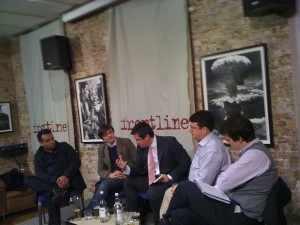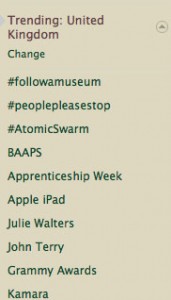This is an edited version of a post that first appeared on KristineLowe.blogs.com. Kristine Lowe is a journalist and blogger based in Norway and president of the Norwegian Online News Association (NONA). Read her last post on Journalism.co.uk: ‘Twitter mishaps and netiquette for journalists‘.
Interested in social media in the newsroom? Come to news:rewired, 14 January 2010. Tickets on sale now. Follow @newsrewired on Twitter (#newsrw).
Are you a journalist 24/7? Does the company you work for own you? Does it harm your credibility as a journalist if you share personal opinions online? Are some opinions more appropriate to share than others?
These are just some of many questions raised by the recent debates on journalists and social media. Some companies, such as Bloomberg, have very strict policies on how journalists may or may not use social media, but in Norway such rules have been absent until now.
However, it was recently brought to my attention that several of the country’s biggest media organisations are working on social media rules for their journalists, which caused The Norwegian Online News Association (NONA), an organisation I’m heading, to host a debate last month.
The reason? We thought it was much better to get such a debate out in the open than have it confined by the walls of each individual media company. If Norwegian is not Greek to you, you’ll find video and notes from the debate over at NONA’s blog, but as these are questions many media organisations are discussing these days, I’ve also translated some key quotes and questions here:
‘The home alone party is over’
“The home alone party is over, now the adults are back and they want rules,” said Jan Omdahl, internet and technology commentator for Norwegian tabloid Dagbladet. He said Dagbladet’s journalists had been playing around with social media from an early stage, but now the media executives had entered the arena, demanding rules.
“It’s very typical that those who don’t use social media, or have started using it very recently, want rules, whereas those who have used social media a lot take the contrary view,” said Nina Nordbö, a social media advisor at Norway’s public broadcaster (NRK) and NONA board member.
“It is perhaps our smallest problem that we lack rules for social media. At the same time one of our biggest problems is that we are part of a tradition for one-way communication that makes us ill-equipped for exploiting the social web,” said Espen Egil Hansen, editor-in-chief of VG.no and NONA board member.
Grey areas
He felt it as important that we learned how to utilise this arena, and make our mistakes now rather than later. He also emphasised that VG.no had strict rules on ethics and he couldn’t see that they needed any more rules than these.
However, Omdahl also pointed out that journalists encounter a whole new set of challenges online. “Even if I as a social media user think we can just continue as we always have done, I do see that we can benefit from raising awareness about these challenges. For instance: should I reply when I get questions on Twitter about why Dagbladet has used five different angles on that sex podcast on NRK.no? Should I confer with my bosses before I reply? Is it appropriate that I share my opinions on one of our most heavily criticised front pages?”
Guidelines or rules
Hanne Kirkenes from ABCNyheter.no pointed out that in her organisation it was not the editors but the journalists who had asked for rules.
“In my experience, our journalists are divided: those who take to social media very naturally and those who think journalists should not be using social media at all,” she said, explaining that as a result of this they had a few simple guidelines on social media. They also had held internal discussions on this and would continue to do so.
John Einar Sandvand, a digital strategist with Aftenposten, Norway’s newspaper of record, explained that his company was in the process of implementing rules for how their journalists use social media, but suggested three very simple ones:
1) The media company should be genuinely positive to its staff being active in social media
2) Social media activities must be done in a way which maintains the professional integrity of journalists
3) Stay loyal to your employer
You can read more about Sandvand’s thoughts on this on his excellent blog Beta Tales (in English).
Impartiality, sources and PR
We touched on several other issues which tend to come up in one form or another whenever journalists’ use of social media is up for discussion, hence I’ll just mention three of these briefly here:
Impartiality: Can a blogger with a strong political agenda or view on a particular issue work as a journalist? Or would it be more useful to ask if a journalist or commentator can do more credible journalism once we know his our her agenda? Espen Egil Hansen suggested that bloggers were blurring the lines between reporting and commenting; that commentators like Omdahl could still do credible journalism; and that in the future we would see more journalists becoming individual brands.
Consensus: Is it a problem that journalists and commentators mostly talk to their peers online, therefore exacerbating media’s herdlike behaviour? A Norwegian editor recently argued this was the case and argued that discussing ideas on Twitter created a consensus among the country’s commentators, and therefore we need rules to regulate media’s use of social media. To this it was pointed out that hacks and columnists have always associated mostly with other media folks, but that at least on Twitter they do so openly and not behind closed doors in the press club . On Twitter they also have (an opportunity) to engage with their readers and can make an effort to expand the network of people they talk and listen to.
PR: Somebody asked whether it was problematic that marketeers and academics got to know a journalist’s interests so well on Twitter that they would know exactly which journalist to choose for pitching a certain issue. My answer? No, no, no: I would LOVE more targeted pitches, if all PRs and marketeers would make the effort to figure out what my beat is and what issues I’m likely to write about I would be absolutely delighted….
Related: Think Before You Re-Tweet: L.A. Times’ Updates Social Media Rules for Journos.

